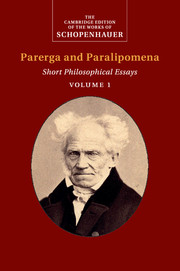Book contents
- Frontmatter
- Contents
- General Editor’s Preface
- Editorial Notes and References
- Introduction
- Notes on Text and Translation
- Chronology
- Bibliography
- Parerga and Paralipomena: Contents
- Preface
- Sketch of a History of the Doctrine of the Ideal and the Real
- Fragments for the History of Philosophy
- On University Philosophy
- Transcendent Speculation on the Apparent Deliberateness in the Fate of the Individual
- Essay on Spirit-Seeing and Related Issues
- Aphorisms on the Wisdom of Life
- Chapter I Fundamental Division
- Chapter II What One Is
- Chapter III What One Has
- Chapter IV What One Represents
- Chapter V Counsels and Maxims
- Chapter VI On the Different Stages of Life
- Versions of Schopenhauer’s Text
- Glossary of Names
- Index
Fragments for the History of Philosophy
Published online by Cambridge University Press: 30 June 2022
- Frontmatter
- Contents
- General Editor’s Preface
- Editorial Notes and References
- Introduction
- Notes on Text and Translation
- Chronology
- Bibliography
- Parerga and Paralipomena: Contents
- Preface
- Sketch of a History of the Doctrine of the Ideal and the Real
- Fragments for the History of Philosophy
- On University Philosophy
- Transcendent Speculation on the Apparent Deliberateness in the Fate of the Individual
- Essay on Spirit-Seeing and Related Issues
- Aphorisms on the Wisdom of Life
- Chapter I Fundamental Division
- Chapter II What One Is
- Chapter III What One Has
- Chapter IV What One Represents
- Chapter V Counsels and Maxims
- Chapter VI On the Different Stages of Life
- Versions of Schopenhauer’s Text
- Glossary of Names
- Index
Summary
About such a histor
To read all kinds of expositions of the doctrines ofthe philosophers, or in general the history ofphilosophy, instead of reading their own originalworks is like letting somebody else chew our food.Would anyone read world history if we were free towatch with our own eyes the events of former timesthat interest us? Now in respect to the history ofphilosophy such an autopsy of the subject isactually available, namely in the original writingsof the philosophers. At any rate, we can then limitourselves, for the sake of brevity, to well-chosenprincipal chapters, the more so as they all aboundin repetitions, which we can spare ourselves. Inthis way we will get to know the essence of theirdoctrines in authentic and unadulterated form,whereas from the half dozen histories of philosophythat now appear every year we merely receive whatentered the head of a philosophy professor, and inthe form in which it there appears at that. It goeswithout saying that the thoughts of a great mind arebound to shrink considerably in order to fit intothe three-pound-brain of such a parasite ofphilosophy, out of which they are then to emergeagain, clothed in the respective jargon of the day,accompanied by his precocious judgement. –Moreover,we can reckon that such a salaried historian ofphilosophy can scarcely have read a tenth of thewritings of which he gives an account. Their realstudy requires all of a long and industrious life,such as formerly the brave Brucker invested in them in the old,studious times. On the other hand, what could suchsmall people have thoroughly researched, while beingdetained by constant lectures, official business,vacation travels and dissipations, to come out withhistories of philosophy in their early years?Moreover, they claim to be pragmatic, to havefathomed and to expound the necessity of the originand sequence of systems, and even want to judge,reprimand and master those serious, genuinephilosophers of the past.
- Type
- Chapter
- Information
- Schopenhauer: Parerga and ParalipomenaShort Philosophical Essays, pp. 31 - 124Publisher: Cambridge University PressPrint publication year: 2014

